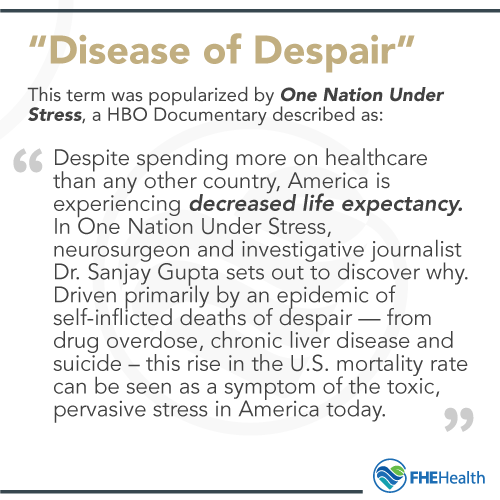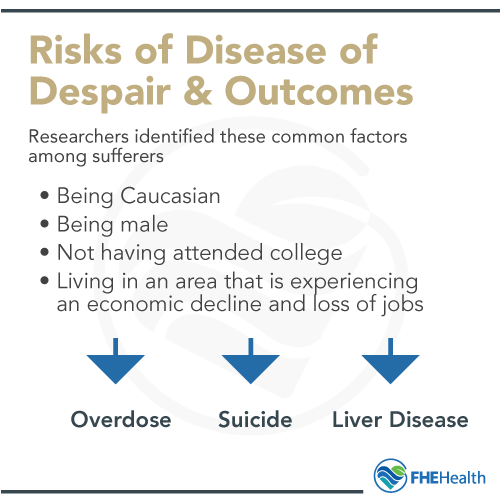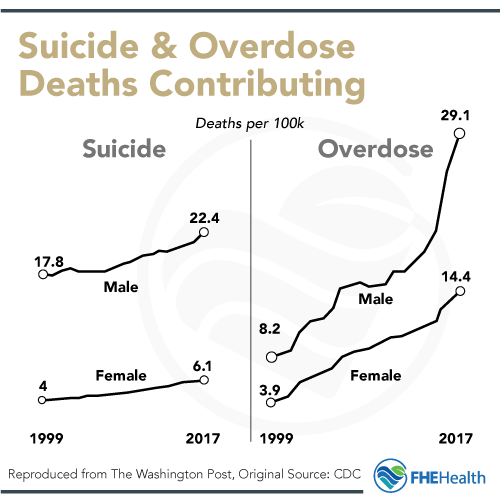
Everyone knows that stress plays a huge role in mental health, and mental health can also have a major impact on your physical health and overall well-being. When stress, anxiety and despair get to extreme levels, they can actually increase your risk of dying from these so-called diseases of despair. Here’s a look at what deaths of despair are, where they come from, and what you can do to help protect your mental health.
What Are Deaths of Despair?
The term “deaths of despair” was made popular with the 2019 HBO documentary “One Nation Under Stress,” which looked at how social and cultural changes in our society are affecting life expediencies and overall mental and physical well-being. While the term may not be entirely accurate considering that a variety of socioeconomic factors come into play as well as the nation’s opioid crisis, it’s one that has been largely accepted as a way to start the conversation about these types of deaths.
Three Main Conditions That Are Part of the Diseases of Despair
 The documentary focuses on how the United States had one of the highest life expectancies among developed countries as late as the 1960s and how all of that has changed, despite an increase in the amount of money we spend on health care. The filmmakers found that some groups who despair that their economic and social outlook is poor and not likely to improve are more at risk for three so-called diseases of despair:
The documentary focuses on how the United States had one of the highest life expectancies among developed countries as late as the 1960s and how all of that has changed, despite an increase in the amount of money we spend on health care. The filmmakers found that some groups who despair that their economic and social outlook is poor and not likely to improve are more at risk for three so-called diseases of despair:
- Overdose (both drug and alcohol)
- Suicide
- Alcoholic liver disease
These deaths are especially high in the Appalachians, a geographic region that runs from Maine to Georgia but is most closely associated with states like West Virginia and Kentucky, and among working-class white Americans who are middle-aged or older.
Risk Factors
 While certain risk factors have been found to increase the chances of someone dying from an overdose, suicide or alcoholic liver disease, it’s important to remember that addiction and depression don’t care about your race, socioeconomic background or religion. Anyone can suffer from addiction or depression at any time in their lives. However, some of the most common risk factors include:
While certain risk factors have been found to increase the chances of someone dying from an overdose, suicide or alcoholic liver disease, it’s important to remember that addiction and depression don’t care about your race, socioeconomic background or religion. Anyone can suffer from addiction or depression at any time in their lives. However, some of the most common risk factors include:
- Being Caucasian
- Being male
- Not having attended college
- Living in an area that is experiencing an economic decline and loss of jobs
One reason for these groups being at larger risk of deaths of despair is that a lack of education or difficulty finding employment can make it very difficult to provide for families. This can increase the overall feelings of hopelessness and depression. These groups also report more physical pain and problems, which may make them more likely to self-medicate with drugs and alcohol.
Some people also talk about the media’s influence in portraying certain lifestyles and products as desirable or as the goal of life, but when these things aren’t consistently affordable for the regular working class, it can lead to feelings of inequality and doom when it comes to personal finances. Even someone with a full-time job may not feel successful if the pay isn’t enough to afford these items. And, ultimately, this can cause a feeling that life is meaningless and there’s no hope for something better.
Effects on Life Expectancy
While it may seem odd that these deaths of despair have such a strong impact that they’ve actually contributed to a lowering of the overall life expectancy in the United States, experts say it’s true. Anne Case and Angus Deaton, authors of “Mortality and Morbidity in the 21st Century,” believe that the spike in deaths of despair from 1998 to 2014 has been strong enough to drop the overall life expectancy.
They say this is likely the result of decades of problems that are just now starting to have a cumulative effect strong enough to be seen across the country. One issue is that this feeling of despair and hopelessness is passed from generation to generation as parents don’t see a way to create a better life for their children or grandchildren.
Steps You Can Take Toward Better Mental Health
 These diseases of despair are very serious and are becoming an epidemic across the country. However, just because people feel like there’s no hope doesn’t mean that there really isn’t any. If you or someone you know is affected by these issues, it’s important to realize that there are some things you can do to start improving your mental health, including:
These diseases of despair are very serious and are becoming an epidemic across the country. However, just because people feel like there’s no hope doesn’t mean that there really isn’t any. If you or someone you know is affected by these issues, it’s important to realize that there are some things you can do to start improving your mental health, including:
- Recognizing that there is a problem: It’s easy to pass off feelings of depression and even despair as life just being hard, but denying the seriousness of these emotions just keeps you in the same cycle. While it can be difficult, letting others know what you’re dealing with and asking for help can be a way forward.
- Focus on developing relationships: Feelings of isolation and loneliness can make depression, anxiety and substance abuse even worse by making it feel like there’s nothing to live for. Developing new and strengthening existing interpersonal relationships — whether that’s with family or friends — can help you connect to the community and give you a support system.
- Seeking help for an addiction or mental health issue: Mental illness and addiction are very difficult to impossible to overcome on your own, but getting outside help from qualified mental health professionals can be the first step toward taking your life back.
If you or someone you love is experiencing factors that may increase their risk for a death of despair, there is help available. At FHE Health, we have a highly trained, dedicated staff who can assess patients and develop a comprehensive treatment plan to help them deal with any underlying issues and get better. Contact us today to talk to one of our staff about our treatment options and how we can help.






